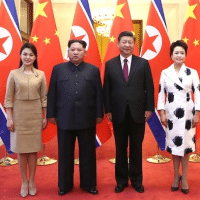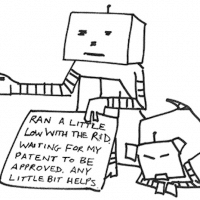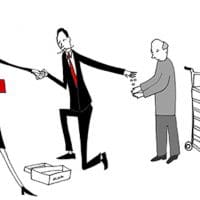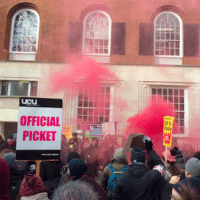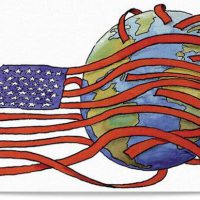-
Basic income: progressive cloak & neoliberal dagger
For almost three decades, the Ontario Coalition Against Poverty (OCAP) has been fighting against neoliberal austerity, especially that aspect of it that has involved systematically degrading systems of income support. The underlying motive in this attack has been to render benefit provision as inadequate and precarious as possible so as to create the desperation that can drive people into the expanding low wage sector.
-
Banking reforms in the context of subordinate financialization
It is both an honor and a pleasure to be here at the event of marking the 75th Anniversary of the Ceylon Bank Employees Union. First, let me offer my heartfelt greetings to CBEU, its office bearers and membership. CBEU has had a proud and celebrated history of struggles that helped immensely to record so many victories to improve the conditions of the working class in general and the bank employees in particular.
-
50 years after 1968: students strikers attacked again
Not an April Fool’s joke. Here are the facts: Four days ago (March 29) the ultra-conservative Dean of the Montpellier University Law School was summoned to police headquarters, interrogated, hauled into court, and held over in jail for arraignment by the Chief Prosecutor–all on the complaint of nine student strikers, who claim to have been brutally assaulted with Dean Philippe Pétel’s active complicity while ‘occupying’ a school auditorium.
-
Calculating surplus value to facilitate workplace organizing
Using Marx’s critique of political economy, it’s possible for workers employed in a variety of industries to calculate the value of their work and how this value is divided between employer and employee. It becomes possible to calculate the socially necessary labor time and surplus labor time, worker wages and employer profits in their particular workplace.
-
Theresa May is playing a reckless game of nuclear roulette
BACK in May 2017, just prior to the British general election, I wrote a piece arguing that a victory for Theresa May would see Britain dragged further towards war with Russia.
-
Kim Jong-un restates his commitment to denuclearization. But will U.S. make way?
With the acceptance of Chinese President Xi Jinping’s invitation, North Korean leader Kim Jong-un visited China from the 25th of this month to the 28th, for the first time since assuming office in 2011. Timed just before Kim’s meeting with the South Korean President Moon Jae-in the next month, followed by a summit with U.S President Donald Trump-where the prospects of denuclearization is expected to be discussed-this meeting with Xi Jinping, in which Kim has reaffirmed his commitment to denuclearization, has been seen my observers as a crucial diplomatic development.
-
Precarious work and contemporary capitalism
Unions have no choice but to put major resources into confronting the reality of precarious work and organising around whatever can be won in the workplace. Otherwise they will simply wither.
-
Ecological destruction in the name of science
How has a science focused on capital accumulation been used to overturn tried and true models of agriculture to the detriment of the environment and indigenous livelihoods?
-
Jeremy Corbyn has a long and honorable record of opposing fascism, racism and anti-semitism
The Labour leader played an active part in organising against and resisting the National Front in the late ’70s.
-
Technology and capitalism 150 years after Das Kapital
Today, one hundred and fifty years after the publication of the first volume of Capital, Marx remains our contemporary.
-
How the United States ‘hacked’ Russia’s elections in the 1990s
In a recent interview that went viral, Russian President Vladimir Putin repudiated NBC journalist Megyn Kelly, when she pressed him on the so-called “Russiagate” scandal.
-
The danger of being wrong about animal rights
Dogs and suitcases are personal property under the law. For the most part, that enables humans to use, neglect, and abuse them indiscriminately. Dogs and other nonhumans have been property at least since the invention of money as suggested by the common etymologies of “chattel,” “cattle,” and “capital.”
-
Marx’s concept of class
The concept of class poses profound problems for theory and practice. This is true across the academic disciplines and in the confused incoherence around “class issues” when concepts of class surface in economic, political and cultural discourses.
-
University strikes: where do we go from here?
On February 22nd the University and College Union (UCU) called for the beginning of a nation wide strike in response to Universities UK’s (UUK) attempt to shift of the Universities Superannuation Scheme from a defined benefit pension to a defined contribution pension.
-
Under the cover of philanthropy: a monopoly machine at work
The long-term costs of allowing a handful of corporations to take over healthcare and agriculture in developing countries, in exchange for vaccinations and hybrid seeds sold at discounted price, will be paid by populations in the Global South once the process of monopolization is complete.
-
Can the Monroe Doctrine triumph in the 21st century?
Although many of us would like to answer this question with a resounding “No!” and insist that our region is well prepared to defend itself against the 1823 pretensions of President James Monroe, with his “America for Americans” -which must be understood as “America for the United States”- it would be a serious mistake to underestimate the risks.
-
The new CIA director nominee and the massacre at My Lai
Protecting those who commit heinous crimes in the name of the U.S. government provides a dangerous precedent and could lead to the conclusion by many in the military and CIA that they can “get away with murder,” Ann Wright observes.
-
Today’s capitalism was born in slavery
By 1830, one million Americans, most of them enslaved, grew cotton. Raw cotton was the most important export of the United States, at the center of America’s financial flows and emerging modern business practices, and at the core of its first modern manufacturing industry.
-
Roxanne Dunbar-Ortiz, Loaded & Gregg Levine on Fukushima Daichi radiation
Roxanne Dunbar-Ortiz tells us about her new book, Loaded: A Disarming History of the Second Amendment.
Then we talk with journalist Gregg Levine about his special investigation for The Nation Magazine into the deaths and illnesses afflicting U.S. sailors exposed to radiation from the Fukushima Daichi meltdown. It’s titled “Seven Years on, Sailors Exposed to Fukushima Radiation Seek Their Day in Court.”
-
Half a year on from Hurricane Maria, many Puerto Ricans lack running water and electricity
PUERTO RICANS marked six months today since the formation of Hurricane Maria, which devastated the island, causing about $100 billion (£72bn) in damage.






